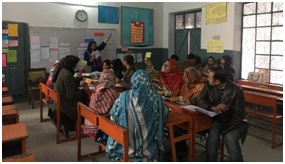Category: News
Rehabilitation and Revitalization of Science Labs
Rehabilitation and Revitalization of Computer Labs
Rehabilitation and revitalization of Science and Computer Labs of 1000 school in 17 District of Punjab (August 2019 -December 2020)
The scope of work covers rehabilitation and revitalization of approximately 1000 science laboratories. This number will be achieved by transforming the existing state of science laboratories in government schools. FAME Education is implementing partner of the project
FAME Education conducted baseline assessment to identify present conditions of the science and computer labs in the selected schools of Punjab along with a detailed review of prevailing culture of teaching and learning of science and computer education in these schools. The purpose of this assessment was to collect data on the indicator against which the impact of the project to be assessed impact as result of the project interventions.
It is envisioned the selected government school science laboratories as becoming dynamic educational spaces where students not only become proficient with the use of lab apparatus and experimental techniques, but also develop a love of exploring nature through their own hands. These labs will become centers of creativity, free exploring experimentation and invention. In order to make this a reality, the current dilapidated setups need to be rehabilitated, and through capacity building and the nurturing of supportive systems, an enabling culture of scientific inquiry needs to become strongly embedded in these schools.
Third Party Evaluation (TPE) of Literacy Interventions in Punjab (February -October 2019)
The Literacy and Nonformal Basic Education Department (L&NFBED), Government of Punjab is operating non-formal Education institutions (NFEIs) across 36 districts of Punjab, and are managed under two major developmental projects including Punjab Non-Formal Education Project (PNFEP) and Taleem Sab Kay Liye (TSKL). Both projects aim to promote primary education, literacy and lifelong skills as well as improve the socio-economic milieu of the most neglected segments of population in Punjab. Each type of NFEI caters to a specific group of marginalized people within a specific age range. For example, NFBES offers primary education from Grade 1 to 5 and targets OOSC aged between 4 to 14 years. Overall, the department operates 15190 NFEIs; out of which 12943 (i.e. 85.21%) are run by female, and 2247 (i.e. 14.79%) are run by male teachers.
The purpose of the TPE reported herewith was to assess the quantitative and qualitative information regarding validations of the PNFEP and TSKL projects, and monitor progress and achievement against the intended targets, challenges faced, and way forward. Consequently, the TPE: a) examined the extent to which PNFEP and TSKL have achieved intended targets, and b) analyzed the viability and effectiveness of PNFEP and TSKL as well as their expected impact on literacy and social development.
A range of research methods were used to collect information from the participants. Several research instruments (e.g. checklists, questionnaires and achievement tests) were developed for different respondents including NFEI teachers, field managers, and community members. In-depth qualitative information was also gathered by using document analysis, semi-structured interviews, focus group discussions and case studies.
Stratified random sampling design was used to select the sample of NFEIs. Sampling unit was the NFEI, and strata were type of NFEI (NFBES, NFEFS and ALC), district, and tehsil. The sampling frame was the database of L&NFBE Department. A total of 2669 (which is 98.2% of the agreed sample) NFEIs were covered in the TPE, as 48 NFEIs included in the sample could not be traced. All teachers (i.e. 2669) working in the selected NFEIs were part of the study. All DEOs Literacy and PLCs, as well as 205 LMs who were working with the sampled NFEIs, were also included in the study. In addition, a total of 22,470 (8,510 male and 13,960 female) learners took the assessments under the TPE, which is more than 40% of the average number of learners enrolled in the sampled NFEIs. Furthermore, a total of 276 communities (which is 10% of the surrounding communities of the selected NFEIs) were included in the sample and out of the selected communities, a total of 1250 community members were also surveyed, on convenience basis.
Third party monitoring and impact assessment of British Council PEELI project (2017-2020)
Improvers’ School Performance-Announcement of annual results for 2014-15 in Districts Attock, Mandi Bahauddin, Rahim Yar Khan, Jhelum, Pakapattan and Nankana under School Improvers’ Programme PESP-II
FAME is collecting success stories under the Improvers’ Programme of Government of Punjab, School Education Department.
FAME is organizing the events under the Improvers’ result campaign campaign in the six districts in coordination with the DMO and EDO Education concerned. Based on the discussion during the campaign sessions and on completion of the Campaign, a comprehensive report along with lessons learnt and recommendations to improve the education at primary level was submitted to PMIU.




